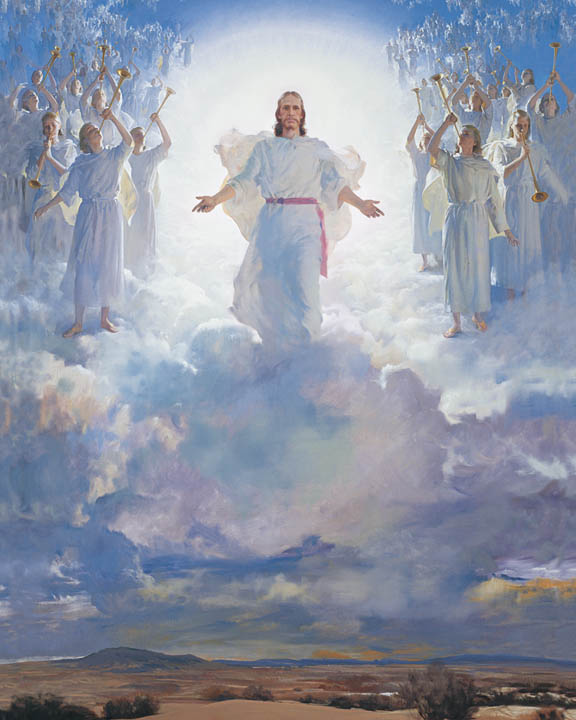The grace of God does more than provide us with salvation; it grants us peace and help every day of our lives, if we call upon God and have faith in the Savior.
 The doctrine of The Church of Jesus Christ of Latter-day Saints (often nicknamed the “Mormon Church”) is that none of us can qualify for salvation using his own power. None is pure enough to enter God’s presence without the loving-kindness and mercy of God making up the difference between our imperfection and God’s perfection. There are many verses in the Holy Bible that speak of the grace of God. There are many more in the Book of Mormon, the Doctrine and Covenants (a collection of modern-day revelations), and the Pearl of Great Price.
The doctrine of The Church of Jesus Christ of Latter-day Saints (often nicknamed the “Mormon Church”) is that none of us can qualify for salvation using his own power. None is pure enough to enter God’s presence without the loving-kindness and mercy of God making up the difference between our imperfection and God’s perfection. There are many verses in the Holy Bible that speak of the grace of God. There are many more in the Book of Mormon, the Doctrine and Covenants (a collection of modern-day revelations), and the Pearl of Great Price.
In the Book of Mormon we read…
Yea, come unto Christ, and be perfected in him, and deny yourselves of all ungodliness; and if ye shall deny yourselves of all ungodliness, and love God with all your might, mind and strength, then is his grace sufficient for you, that by his grace ye may be perfect in Christ; and if by the grace of God ye are perfect in Christ, ye can in nowise deny the power of God.
And again, if ye by the grace of God are perfect in Christ, and deny not his power, then are ye sanctified in Christ by the grace of God, through the shedding of the blood of Christ, which is in the covenant of the Father unto the remission of your sins, that ye become holy, without spot. (Moroni 10:32, 33).
Nevertheless, the Lord God showeth us our weakness that we may know that it is by his grace, and his great condescensions unto the children of men, that we have power to do these things (Jacob 4:7).
And behold, I have come having great hopes and much desire that I should find that ye had humbled yourselves before God, and that ye had continued in the supplicating of his grace, that I should find that ye were blameless before him…(Alma 7:3).
And if men come unto me I will show unto them their weakness. I give unto men weakness that they may be humble; and my grace is sufficient for all men that humble themselves before me; for if they humble themselves before me, and have faith in me, then will I make weak things become strong unto them (Ether 12:27).
And also my soul delighteth in the covenants of the Lord which he hath made to our fathers; yea, my soul delighteth in his grace, and in his justice, and power, and mercy in the great and eternal plan of deliverance from death (2 Nephi 11:5).
Wherefore, my beloved brethren, reconcile yourselves to the will of God, and not to the will of the devil and the flesh; and remember, after ye are reconciled unto God, that it is only in and through the grace of God that ye are saved (2 Nephi 10:24).
 Mormon prophets and apostles have taught the children of God about grace, urging them to seek it in their lives and for the afterlife.
Mormon prophets and apostles have taught the children of God about grace, urging them to seek it in their lives and for the afterlife.
“[Grace is] a word that occurs frequently in the New Testament, especially in the writings of Paul. The main idea of the word is divine means of help or strength, given through the bounteous mercy and love of Jesus Christ.
“It is through the grace of the Lord Jesus, made possible by his atoning sacrifice, that mankind will be raised in immortality, every person receiving his body from the grave in a condition of everlasting life. It is likewise through the grace of the Lord that individuals, through faith in the atonement of Jesus Christ and repentance of their sins, receive strength and assistance to do good works that they otherwise would not be able to maintain if left to their own means. This grace is an enabling power that allows men and women to lay hold on eternal life and exaltation after they have expended their own best efforts. [1]
I bear my witness of the living reality of the Bread of Life, Jesus Christ, and of the infinite power and reach of His Atonement. Ultimately, it is His Atonement and His grace that is our daily bread. We should seek Him daily, to do His will each day, to become one with Him as He is one with the Father (see John 17:20–23). As we do so, may our Heavenly Father grant us our daily bread. [2]
It is not repentance per se that saves man. It is the blood of Jesus Christ that saves us. It is not by our sincere and honest change of behavior alone that we are saved, but “by grace that we are saved, after all we can do” (2 Nephi 25:23). True repentance, however, is the condition required so that God’s forgiveness can come into our lives. [3]
The holy affirmations I have had regarding the Savior and His restored Church first came to me as a young man when I read the Book of Mormon. It was while reading this sacred record that I felt—again and again—the undeniable whispering of the Holy Ghost declaring to my soul its truthfulness.
Reading the book was the beginning of my light. It was the source of my first spiritual certainty that God lives, that He is my Heavenly Father, and that a plan of happiness was outlined in eternity for me. It led me to love the Holy Bible and the other standard works of the Church. It taught me to love the Lord Jesus Christ, to glimpse His merciful compassion, and to consider the grace and grandeur of His atoning sacrifice. [4]
Should we ignore this great gift of mercy and enabling power that can make up for our weakness in mortality and return us to God’s presence in immortality? Should we go through life as best we can on our own power? Many do. At least many try. But blessed is the person who comes to a point where he or she comes to realize that human power is not enough, and there is a vast but unseen reality full of blessings and gifts that can be tapped into if one will come to his knees and seek the grace of the Savior. The atonement has already been wrought. Christ has already suffered for the sins of every man and woman ever to live on this earth. Just as one expects the lights in a room to come on when he flicks a switch, knowing the power is already there and available, so is God’s grace. It stands at the ready with ultimate, ever-accessible, enabling power, if we just call on Him.

 Watch a video about the restoration of the gospel on lds.org
Watch a video about the restoration of the gospel on lds.org